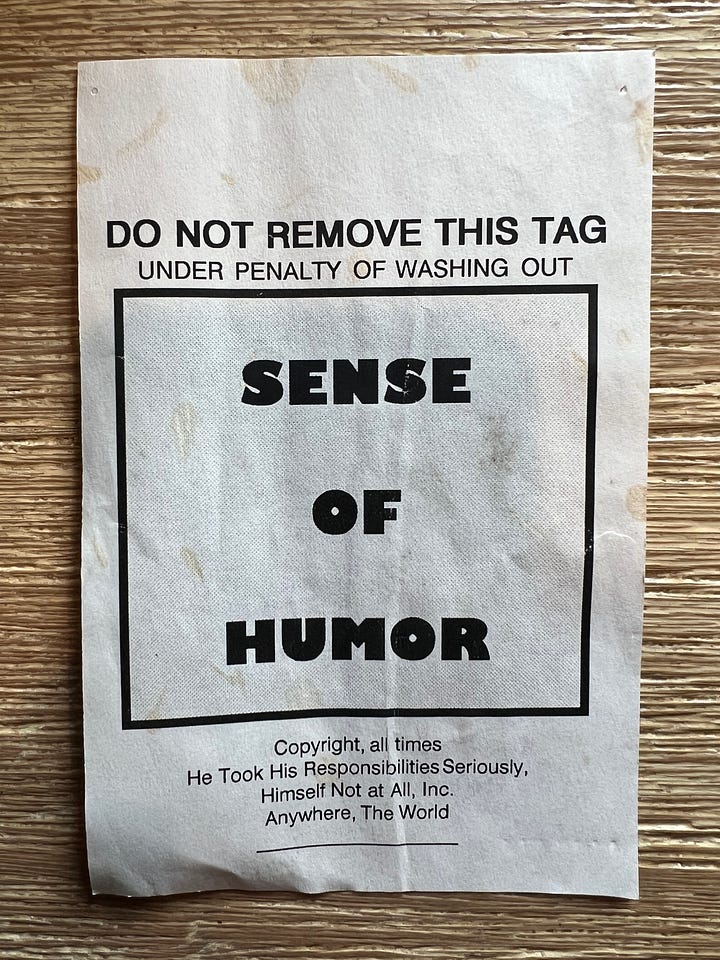We all know the old axiom, “laughter is the best medicine.” An authority figure like a parent or teacher probably first uttered this when we were kids, and we’ve heard it numerous times since. It’s a simple reminder that when you aren’t feeling great (mentally, physically, or both), figuring out a way to elevate your mood is often an effective remedy, at least in part. You can do it anywhere at any time, can’t overdose, and it’s free. That’s a wonder drug.
And yet, as adults, we either forget this advice or no longer believe it. Maybe because we learned it during our formative years, we treat such counsel like a contention Santa Claus exists. That’s for children, not us grown-ups. Because in our world, things are serious. We have real responsibilities and problems. I’ve got a job, a mortgage, and a family to worry about.
Of course, the world is a serious place, too. Outside the confines of my home, the community is changing in ways I don’t appreciate. The political landscape nationwide is a mess. There’s a constant stream of misinformation, disinformation, and malformation on the internet I must rally against. We now face existential threats. Nuclear war is looming in a way we haven’t experienced in decades. Climate change might kill us. If not, AI probably will.
Above all, people need to take me and my agenda seriously. My opinions are important. What matters to me is consequential to everyone. My struggles and causes can’t be mocked. And you better not offend me, so stay on your toes. A person’s feelings are sacred and nothing to be trifled with, especially mine.
In case it isn’t apparent, I’m writing from the viewpoint of a generic American societal avatar in the last few paragraphs. While the tone is somewhat facetious and hyperbolic, it’s not far off the mark for many of us. There certainly are things we should give the appropriate degree of importance and gravity. But increasingly, we apply that attitude to absolutely everything. And this approach is destructive when it’s finally aimed at the one thing we always must maintain the ability to ridicule—ourselves.
My father often said, “He took his responsibilities seriously, himself not at all.” Usually, he did this in response to some situation where I needed to lighten up about my circumstances. There wasn’t some imminent mortal danger in play. No one’s health was at risk. I was purely wrapped up in my emotions and treating myself like the center of the universe. On those occasions, the best thing I could do was find a way to laugh. But I often failed to do so.
The absolute best example was a few weeks into my initial exposure to military life at the Naval Academy. I hadn’t experienced anything like it as a kid. So, when faced with people screaming at me all day during the crucible of Plebe Summer, I did not adapt well initially. I’d love to say I was a “duck” and let every insult and humiliation roll off me like water on feathers. But I mostly did the opposite. I took things personally.
At night, I was often depressed and even shed tears at times. Within the first few weeks, I wrote my dad a letter (after all, we didn’t have cell phones or the internet) stating that maybe the military wasn’t for me. I essentially wanted him to give me a license to quit, and I told him I was sorry if I was letting him down. A few weeks later, I received his response. In no uncertain terms, he said that nothing I did could disappoint him. He would always love me regardless. But if I made that choice, I better be sure I wasn’t letting myself down.
He also included what can best be described as a homemade mattress tag—one of those sewn-in labels that states, “Do not remove under penalty of law.” His version was just a tiny piece of paper with the words “SENSE OF HUMOR” printed in capital letters, but it was a potent reminder. Sometimes, the best countermeasure to wallowing in self-pity is stepping back and cracking a smile. Objectively look for the big deal in the scenario and realize it doesn’t exist. Nearly any situation is worthy of mockery. Never forget you can view it as such.
On the back of the sheet, my father typed Rudyard Kipling’s poem If. The core theme of that composition is simply an extension of the same message. Don’t let circumstances dictate your responses. Choose them.


From then on, I didn’t chop around the passageways of Bancroft Hall in a state of transcendent bliss.1 However, on more than one occasion, while braced up against a bulkhead, I could assess the scene as nothing more than a bunch of nineteen-year-olds screaming at a bunch of seventeen-year-olds about their lack of ability to memorize lunch menus and useless sayings.2 Those actions did serve a purpose but were also patently absurd. Most importantly, none of it was aimed at me personally. There was zero reason to consider myself a victim or target.
That same idea applies to nearly all of life. Almost nothing happens to you. It just happens. Either way, any instance can be pretty fucking funny if you want it to be. People laugh at funerals. For those fleeting moments, no one is unhappy because it’s impossible to sob and chuckle simultaneously. You can do them in quick succession, but not at the same time. That’s a valuable lesson.
Instead of seeking outrage and offense, we should all find ways to crack up proactively. Most people succumb to their feelings instead of observing and improving them. If it’s a “bad day,” they wait around and hope things get better. Processing emotions is essential, but that doesn’t mean you must be a slave to them. And we certainly shouldn’t waste any time feeling sorry for ourselves.
I have a playlist of my favorite comedy bits from the likes of Bill Burr, Lewis Black, Jim Gaffigan, Patton Oswalt, Dave Attell, Brian Regan, and Mitch Hedberg that I queue up when I need a mood boost. I also pinned a few videos in my browser from YouTube, to watch whenever necessary. My go-to is below. I’ve seen it a hundred times and still howl at it. More importantly, I forget about whatever bullshit I may be stewing on for those few minutes. It probably wasn’t worth getting all that worked up over in the first place.
If there’s one thing in this world you can never afford to take seriously, it’s yourself. Regardless of your circumstances, laughter is often either the best medicine or the most effective zero-cost therapy at your disposal. And as per The Four Agreements, never take things personally. If neither foes nor loving friends can hurt you, then yours is the Earth and everything that’s in it. Just remember you’re still not the center of the universe. You’re not even close to the center. So lighten up, Francis.
Level up your mental health:
Subscribe to the RARE SENSE Substack.
Subscribe to the RARE SENSE podcast on any major streaming platform and leave a five-star review if you love it.
Subscribe to the RARE SENSE YouTube channel.
Take the RARE SENSE Challenge.
Connect with me on all major social media platforms @thischrisirwin.
Invite me to speak about mind fitness to your organization by filling out the RARE SENSE contact form.
You can also support my work by purchasing RARE SENSE gear or sharing my content with others.
DISCLAIMER: RARE SENSE content is not medical advice. Nor does it represent the official position or opinions of any other organization or person. If you require diagnosis or treatment for a mental or physical issue or illness, please seek it from a licensed professional.
To “chop” means jogging down the middle of the hall and squaring your corners.
“Bracing” is a practice to create better posture whereby one pushes their chin into their neck. It forces you to stand up straight and look forward. A “bulkhead” is a wall on a ship.





